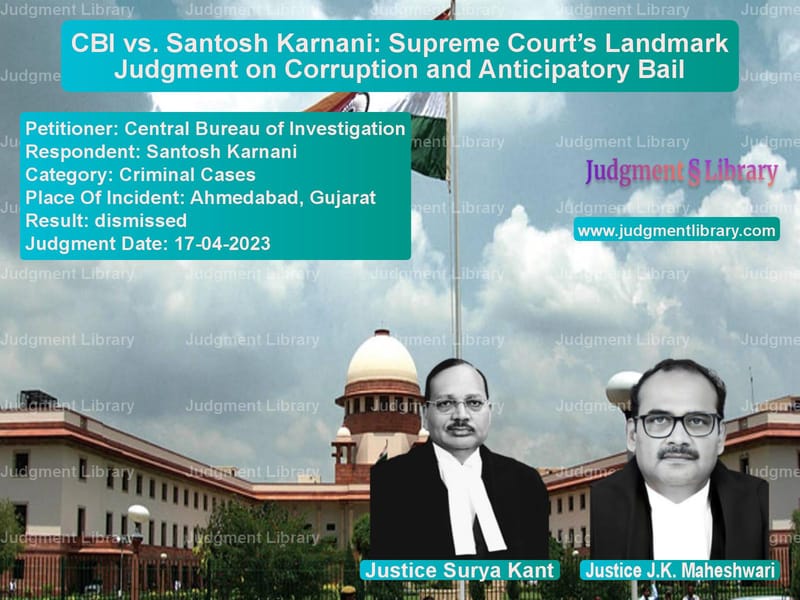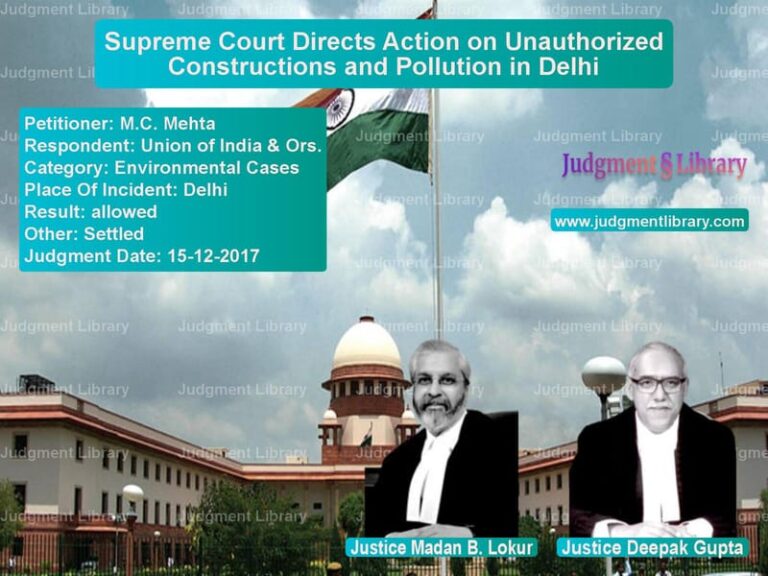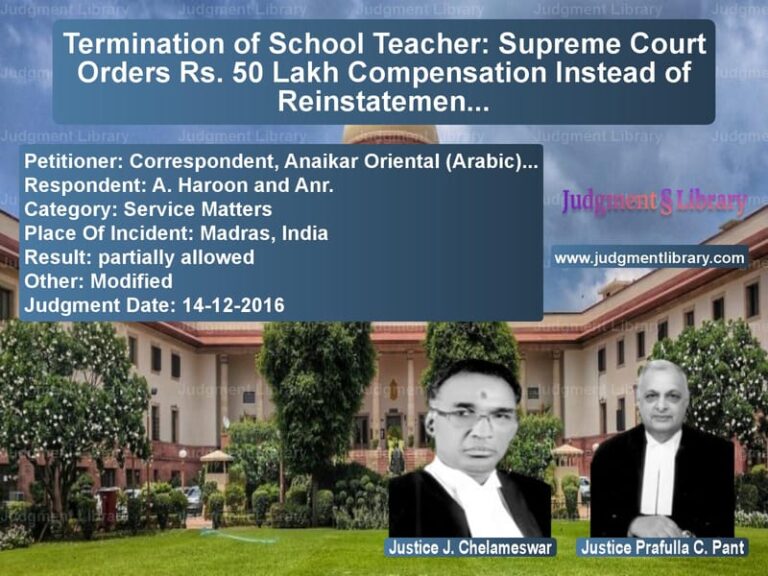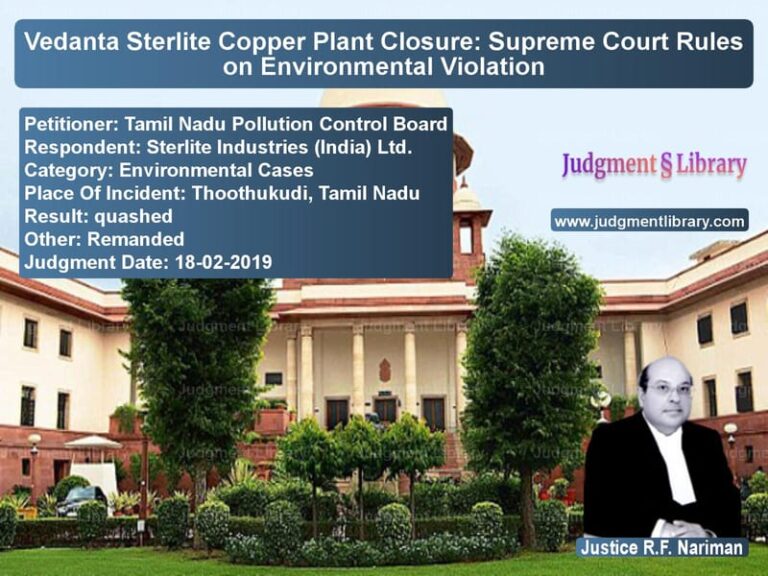CBI vs. Santosh Karnani: Supreme Court’s Landmark Judgment on Corruption and Anticipatory Bail
The Supreme Court of India recently delivered a significant judgment in the case of the Central Bureau of Investigation (CBI) vs. Santosh Karnani, concerning serious allegations of corruption, bribery, and abuse of power by a senior Income Tax officer. The case primarily revolved around the granting of anticipatory bail by the Gujarat High Court, which the CBI contested, leading to a thorough examination by the Supreme Court. This ruling sets a precedent regarding anticipatory bail in corruption cases and emphasizes the necessity of custodial interrogation in cases where evidence suggests systemic corruption.
The Supreme Court’s verdict overturned the Gujarat High Court’s decision and denied anticipatory bail to Santosh Karnani, an Additional Commissioner of Income Tax, accused of demanding and accepting an illegal gratification of ₹30 lakhs. The judgment underscores the need for stringent action against corruption and highlights the role of law enforcement agencies in ensuring justice.
Background of the Case
The case stemmed from an income tax investigation into Safal Construction Pvt. Ltd., a business associated with the complainant. The case took a turn when the accused, an officer in the Income Tax Department, allegedly sought a bribe of ₹30 lakhs to influence the proceedings favorably. The complainant, in collaboration with the Anti-Corruption Bureau (ACB), recorded conversations, set up a trap, and lodged a formal complaint leading to the CBI’s intervention.
Read also: https://judgmentlibrary.com/supreme-court-upholds-murder-conviction-in-balu-sudam-khalde-case/
The FIR was initially filed by the ACB, but due to the gravity of the allegations and the involvement of a senior official, the case was later transferred to the CBI. The investigation uncovered evidence in the form of voice recordings, witness statements, and financial transactions that linked the accused to the bribery allegations. Despite these findings, the Gujarat High Court granted anticipatory bail to the accused, prompting the CBI to challenge the decision before the Supreme Court.
Legal Arguments Presented
Petitioner (CBI) Arguments
- Seriousness of the Offense: The CBI argued that the nature of the offense, involving bribery and abuse of a senior government position, warranted stringent action. The grant of anticipatory bail could hinder the ongoing investigation.
- Clear Evidence of Corruption: The CBI presented voice recordings and forensic reports confirming the accused’s demand and acceptance of a bribe.
- Attempts to Evade Arrest: The accused reportedly absconded when officials attempted to arrest him, misleading authorities by providing false information about his whereabouts.
- Custodial Interrogation Required: Given the involvement of multiple individuals, custodial interrogation was essential to uncover the larger conspiracy and identify other complicit officials.
- Legal Precedents: The CBI cited Supreme Court rulings emphasizing that anticipatory bail should not be granted in cases of serious economic offenses and corruption.
Respondent (Santosh Karnani) Arguments
- False Allegations: The defense argued that the allegations were baseless and motivated by personal vendetta.
- Lack of Direct Evidence: The defense pointed out that the money was not directly recovered from the accused but was deposited in a third-party account, weakening the case for direct involvement.
- Delayed FIR: The defense highlighted that there was an unexplained delay in registering the FIR, raising questions about the credibility of the prosecution’s claims.
- Cooperation with Investigation: The accused claimed he had fully cooperated with the authorities and was willing to provide any necessary information.
- Impeccable Service Record: The defense emphasized the accused’s unblemished record in government service, arguing that his professional history did not suggest any prior misconduct.
Supreme Court’s Observations and Rationale
The Supreme Court, led by Justices Surya Kant and J.K. Maheshwari, conducted a detailed review of the evidence and legal provisions applicable in the case. The Court made several critical observations:
- Corruption as a Grave Offense: The Court stressed that corruption undermines public trust and must be dealt with strictly.
- Need for Custodial Interrogation: The accused’s evasive behavior, destruction of evidence, and potential involvement of other officials necessitated thorough interrogation in custody.
- Prima Facie Evidence: The Court found sufficient material to establish a strong case against the accused, rejecting the argument that there was no direct evidence.
- Public Interest Considerations: The Court noted that granting anticipatory bail in corruption cases could set a dangerous precedent, allowing accused officials to evade justice.
Final Judgment
After careful deliberation, the Supreme Court ruled in favor of the CBI, overturning the Gujarat High Court’s decision. The key takeaways from the judgment include:
- Denial of Anticipatory Bail: The Court concluded that the accused must face custodial interrogation to ensure a comprehensive investigation.
- Emphasis on Strict Anti-Corruption Measures: The Court reiterated that corruption cases require a stringent legal approach to deter misconduct among public officials.
- Legal Precedents Upheld: The ruling reinforced existing Supreme Court judgments that discourage anticipatory bail in cases involving serious economic offenses.
Implications of the Judgment
This ruling serves as a landmark decision reinforcing the need for strict measures against corruption. The Supreme Court has reaffirmed its stance that public officials accused of corruption must face rigorous scrutiny to ensure accountability.
Read also: https://judgmentlibrary.com/supreme-court-acquits-appellant-in-robbery-case-due-to-lack-of-evidence/
The judgment is expected to influence future cases where anticipatory bail is sought in corruption matters. It establishes that judicial discretion should be exercised cautiously, ensuring that investigations are not hampered by premature legal relief.
Conclusion
The Supreme Court’s decision in CBI vs. Santosh Karnani underscores the gravity of corruption cases and the necessity of custodial interrogation in complex investigations. By denying anticipatory bail, the Court has sent a strong message that economic offenses and bribery by public officials will not be tolerated. The ruling aligns with India’s ongoing efforts to strengthen anti-corruption mechanisms and uphold transparency in governance.
Moving forward, this judgment will serve as a precedent in cases involving public officials accused of corruption, ensuring that legal safeguards are upheld while maintaining the integrity of investigations.
Petitioner Name: Central Bureau of Investigation.Respondent Name: Santosh Karnani.Judgment By: Justice Surya Kant, Justice J.K. Maheshwari.Place Of Incident: Ahmedabad, Gujarat.Judgment Date: 17-04-2023.
Don’t miss out on the full details! Download the complete judgment in PDF format below and gain valuable insights instantly!
Download Judgment: central-bureau-of-in-vs-santosh-karnani-supreme-court-of-india-judgment-dated-17-04-2023.pdf
Directly Download Judgment: Directly download this Judgment
See all petitions in Bail and Anticipatory Bail
See all petitions in Fraud and Forgery
See all petitions in Money Laundering Cases
See all petitions in Judgment by Surya Kant
See all petitions in Judgment by J.K. Maheshwari
See all petitions in dismissed
See all petitions in supreme court of India judgments April 2023
See all petitions in 2023 judgments
See all posts in Criminal Cases Category
See all allowed petitions in Criminal Cases Category
See all Dismissed petitions in Criminal Cases Category
See all partially allowed petitions in Criminal Cases Category







